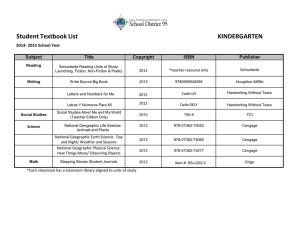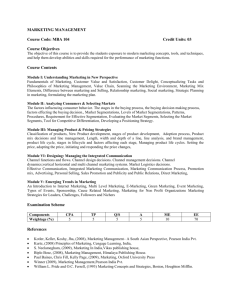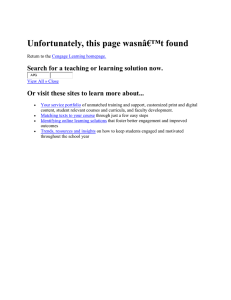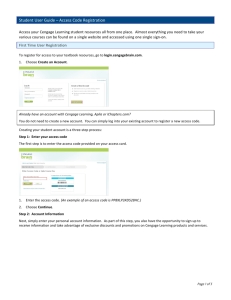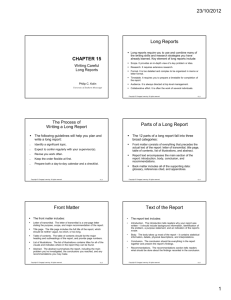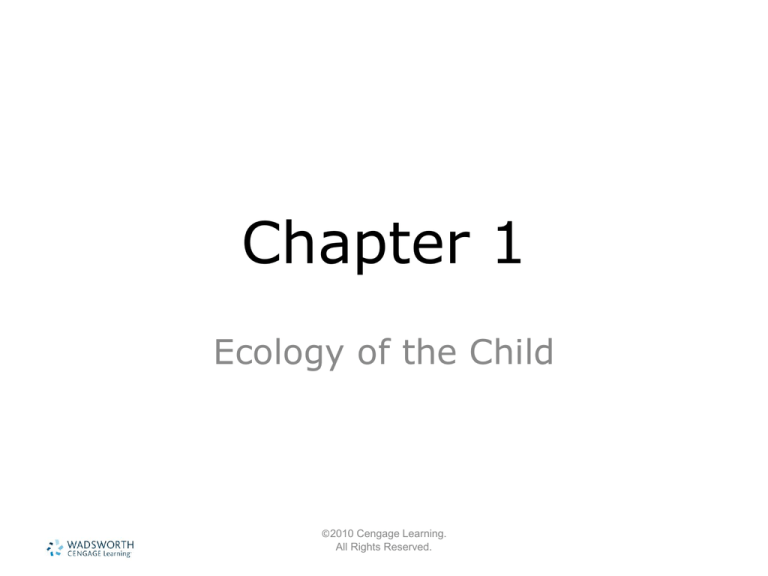
Chapter 1
Ecology of the Child
©2010 Cengage Learning.
All Rights Reserved.
The more things change, the
more they remain the same.
Alphonse Karr
©2010 Cengage Learning.
All Rights Reserved.
Ecology, Change, and
Children
©2010 Cengage Learning.
All Rights Reserved.
Human Ecology
• Involves biological, psychological,
and cultural contexts
• The contexts of development help
define human processes that develop
over time, such as
– Perceptions
– Learning
– Individual and group behavior
©2010 Cengage Learning.
All Rights Reserved.
Human Ecology
• The biological, psychological, social,
and cultural contexts in which a
developing person interacts
and the consequent processes that
develop over time.
©2010 Cengage Learning.
All Rights Reserved.
Socialization and
Child Development
©2010 Cengage Learning.
All Rights Reserved.
Socialization
• The process by which individuals
acquire the knowledge, skills, and
character traits that enable them to
participate as effective members of
groups and society
©2010 Cengage Learning.
All Rights Reserved.
Socialization
• Unique to humans
• Reciprocal and dynamic
• Socialization occurs
• through interaction with significant
others
• by means of communication
• in emotionally significant contexts
©2010 Cengage Learning.
All Rights Reserved.
Intentional Socialization
• Socialization in which values are
consistently conveyed, and backed
up with
• approval for compliance
• negative consequences for
noncompliance
©2010 Cengage Learning.
All Rights Reserved.
Unintentional Socialization
• Socialization that takes place
spontaneously
• without the deliberate intent to impart
knowledge or values
©2010 Cengage Learning.
All Rights Reserved.
Socialization, Change
and Challenge
©2010 Cengage Learning.
All Rights Reserved.
Socializing Agents
• Children are socialized by many
people.
• Socializing agents change their
practices or views over time in
reaction to, or as a result of, societal
change.
©2010 Cengage Learning.
All Rights Reserved.
Childhood: Historical
Perspectives
•
•
•
•
The Renaissance
Development of the Printing Press
The Industrial Revolution
Childhood Today
©2010 Cengage Learning.
All Rights Reserved.
Socialization in an
Ecological Context
©2010 Cengage Learning.
All Rights Reserved.
Theory
• An organized set of statements that
explains observations, integrates
different facts or events, and
predicts future outcomes
• Bronfenbrenner’s Bioecological Model
©2010 Cengage Learning.
All Rights Reserved.
©2010 Cengage Learning.
All Rights Reserved.
Microsystem
• Activities and relationships with
significant others experienced by a
developing person in a particular
small setting
• Examples are family, school, peer
group, and community
©2010 Cengage Learning.
All Rights Reserved.
Mesosystem
• Linkages and interrelationships
between two or more of a person’s
microsystems
©2010 Cengage Learning.
All Rights Reserved.
Exosystem
• Settings in which children do not
actually participate, but which affect
them in one of their microsystems
©2010 Cengage Learning.
All Rights Reserved.
Macrosystem
• The society and subculture to which
the developing person belongs, with
particular reference to belief
systems, lifestyles, patterns of
interaction, and life changes
©2010 Cengage Learning.
All Rights Reserved.
Low-Context Macrosystem
Rationality
Individuality
Practicality
Progress
Competition
©2010 Cengage Learning.
All Rights Reserved.
High-Context Macrosystem
Intuitiveness
Group
Identity
Emotionality
Tradition
Cooperation
©2010 Cengage Learning.
All Rights Reserved.
Chronosystem
• Temporal changes in ecological
systems or within individuals,
producing new conditions that affect
development
©2010 Cengage Learning.
All Rights Reserved.
Contemporary
Ecology
©2010 Cengage Learning.
All Rights Reserved.
Contemporary Ecology
Biotechnology
Societal vs. individual responsibility
Information technology
Globalism/nationalism
Shifts in decision-making
responsibility
• Information intermediaries
•
•
•
•
•
©2010 Cengage Learning.
All Rights Reserved.

